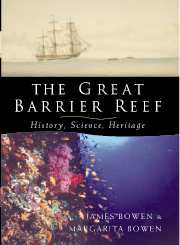Book contents
- Frontmatter
- Contents
- Abbreviations and Acronyms
- Preface
- Acknowledgments
- Introduction: An Overview
- Part One NAVIGATORS AND NATURALISTS IN THE AGE OF SAIL
- Chapter 1 QUEST FOR THE GREAT SOUTH LAND
- Chapter 2 VOYAGE OF THE ENDEAVOUR: COOK AND THE ‘LABYRINTH’
- Chapter 3 ENDEAVOUR NATURALISTS: ‘A SEPARATE CREATION’
- Chapter 4 MATTHEW FLINDERS: VOYAGE OF THE INVESTIGATOR
- Chapter 5 THE REEF EXPLORED: EARLY SURVEYS, 1821–1844
- Chapter 6 EARLY REEF CHARTS COMPLETED: 1846–1862
- Chapter 7 THE REEF AS A MARITIME HIGHWAY: COLONY OF QUEENSLAND, 1859–1900
- Chapter 8 FROM NATURAL HISTORY TO SCIENCE, 1850–1900: VOYAGES OF THE CHALLENGER AND THE CHEVERT
- Chapter 9 EXPLOITATION AND RESOURCE RAIDING: 1860–1890
- Chapter 10 FOR MAXIMUM YIELD: REEF BIOLOGY
- Part Two A NEW ERA IN REEF AWARENESS: FROM EARLY SCIENTIFIC INVESTIGATION TO CONSERVATION AND HERITAGE
- References
- Index
Chapter 3 - ENDEAVOUR NATURALISTS: ‘A SEPARATE CREATION’
from Part One - NAVIGATORS AND NATURALISTS IN THE AGE OF SAIL
Published online by Cambridge University Press: 22 September 2009
- Frontmatter
- Contents
- Abbreviations and Acronyms
- Preface
- Acknowledgments
- Introduction: An Overview
- Part One NAVIGATORS AND NATURALISTS IN THE AGE OF SAIL
- Chapter 1 QUEST FOR THE GREAT SOUTH LAND
- Chapter 2 VOYAGE OF THE ENDEAVOUR: COOK AND THE ‘LABYRINTH’
- Chapter 3 ENDEAVOUR NATURALISTS: ‘A SEPARATE CREATION’
- Chapter 4 MATTHEW FLINDERS: VOYAGE OF THE INVESTIGATOR
- Chapter 5 THE REEF EXPLORED: EARLY SURVEYS, 1821–1844
- Chapter 6 EARLY REEF CHARTS COMPLETED: 1846–1862
- Chapter 7 THE REEF AS A MARITIME HIGHWAY: COLONY OF QUEENSLAND, 1859–1900
- Chapter 8 FROM NATURAL HISTORY TO SCIENCE, 1850–1900: VOYAGES OF THE CHALLENGER AND THE CHEVERT
- Chapter 9 EXPLOITATION AND RESOURCE RAIDING: 1860–1890
- Chapter 10 FOR MAXIMUM YIELD: REEF BIOLOGY
- Part Two A NEW ERA IN REEF AWARENESS: FROM EARLY SCIENTIFIC INVESTIGATION TO CONSERVATION AND HERITAGE
- References
- Index
Summary
The voyage of the Endeavour was to have profound political and scientific consequences in Europe. The immediate result was an almost complete cartography of the world's oceans: the myth of a single great southern landmass was dispelled and Cook's careful mapping of the Pacific, amplified in his second and third voyages, 1772–75 and 1776–79, with the aid of William Harrison's new marine chronometer, enabled the first accurate world maps to be published. Such accuracy had a stunning impact on Europeans: it revealed, finally, the vastness of the Pacific, reaching some 16 000 kilometres from the Arctic to the Antarctic – from Bering Strait to the Ross Sea – and from Panama to the Philippines, some 18 000 kilometres. Even so, in the days of square-rigged ships when overseas voyages were reckoned in many months and often years, the geographical extent of the Pacific remained virtually incomprehensible. Along with scientific discoveries of strange biota, the reports from French and British voyagers of previously unknown exotic societies in the Pacific gave a stimulus to the newly emerging science of ethnology. Once relayed to Europe and heightened by the popular and sensationalising press, each new report dazzled the imagination.
Cook's voyages occurred in the same period as the apogee of the French Enlightenment, promoted by Rousseau, Voltaire, Diderot and the Encyclopedists.
- Type
- Chapter
- Information
- The Great Barrier ReefHistory, Science, Heritage, pp. 41 - 55Publisher: Cambridge University PressPrint publication year: 2002



